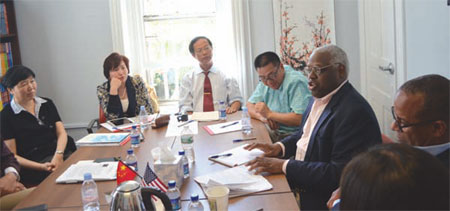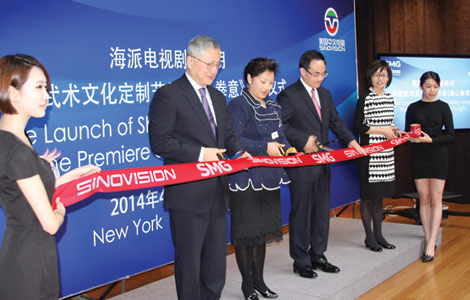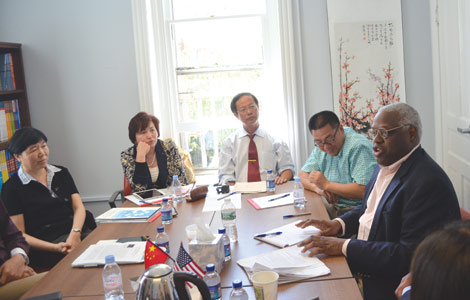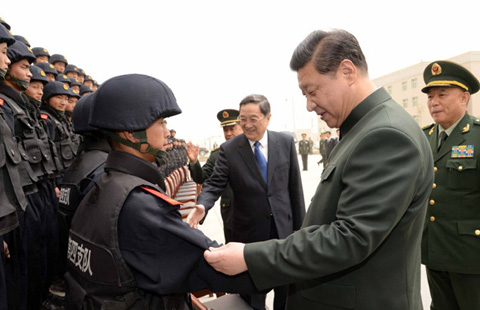Minority literary figures exchange 'dreams'
Updated: 2014-04-29 12:28
By Liu Chang in Washington (China Daily USA)
|
||||||||
|
Chinese minority writers sit down and talk with US minority writers on Sunday at the Confucius Institute of George Washington University. The concept of sound in fiction was stressed by Eric May, associate professor from the Department of Creative Writing of Columbia College Chicago, as he sang a song. From left: Yan Li, Kuerbanbaike Yeerkexi, Rongguo Li, Ling Pan, Eric May and H.G. Carrillo. Liu Chang / China Daily |
No matter where we are from, no matter what ethnicity we are, our understanding of one another's emotions and life experiences are something we all have in common.
That was just one of the sentiments expressed at a discussion of literary works by minority writers entitled One World-Same Dream held recently at the George Washington University (GW) in Washington. Through writing their own work and reading the work of others, minority writers from both China and the US overcome barriers of languages and cultural differences and connected by discussing literature.
Chinese writers of Tibetan, Manchu, Hazakh, Li, Buyi ethnicities led by Xianping Liu, director of the International Liaison Department of Chinese Writers Association, met and talked with H.G. Carrillo, assistant professor of English at GW, and Eric May, associate professor of creative writing at Columbia College of Chicago, on Sunday at GW's Confucius Institute.
Across cultures, lives converge and diverge, May said. A story that happens here in some way won't be the same as a story that happens over there, said May, an African American, stressing the importance of the concept of place in a fiction.
"Place influences people's acts. It is their culture," he said, adding that when he read the Chinese writers' works, he sensed all kinds of atmospheres.
"Not just the descriptions of what things look like," May said. "It is more about places, people and how they interact with each other."
Hanyin Yin, who is of Manchu ethnicity and vice-president of the Chinese Minority Writers Society, said although China and the US are across the Pacific Ocean from one another, reading fellow writers' works instantly brings the two sides closer.
"Since minorities in every country are a marginalized group, the histories of their existence and evolution bear similarities," Yin said.
May said talking with Chinese minority writers "opened up a whole new world". Suddenly I see China in a way that I have not seen it before." He added that there is a tendency for people to see other countries as monolithic, but "nature is diverse. It is not necessary a monolithic things".
Carillo, an African Cuban, said, "The most memorable moment of this interaction with Chinese minority writers is that their opinions and their thinking about being a minority are dissimilar from minority writers in the US.
"Minority writers in the US seem to feel they are writing for a larger majority audience," he said. "Minority writers in China are writing themselves. They are writing about whom they are, where they are from. I would love for lots of American minority writers to share that opinion, rather than to write for other people, not just 'this is what ethnic writers sound like or should do'."
Rongguo Li, of Li ethnicity, a member of the China Writers Association, said that Chinese and US minority writers had few opportunities to exchange ideas in the past.
He said that through exchanges and communication, they could learn great writing skills from each other, for example, "The same story could be evolved through different locations and time. I look forward to more future communications between China Writers Association and other countries' writers."
changliu@chinadailyusa.com
Most Viewed
Editor's Picks

|

|

|

|

|

|
Today's Top News
NBA bans Clippers owner from game for life over racist commen
China's CEOs confident
Alibaba IPO could be the biggest
Chinese youths get their chance at stardom and recording deals
Cookiemaker announces plans to roll into smaller cities
Bill Gates urges more in China to help poor
Philippine pact gives US access to air, sea bases
Obama sets new sanctions on Russia
US Weekly

|

|
















